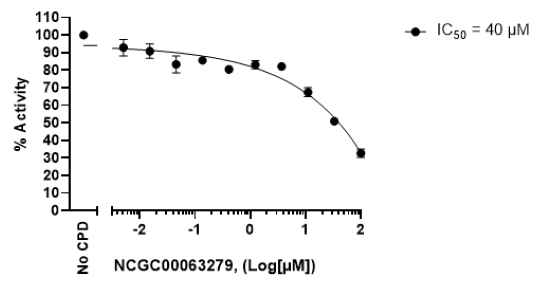WRN Assay Service
●
Target
WRN
●
Description
Screening and/or profiling inhibitor compounds against WRN helicase activity in a biochemical assay.
●
Synonyms
Bifunctional 3'-5' exonuclease/ATP-dependent helicase WRN, DNA helicase, RecQ-like type 3, RecQ protein-like 2, Werner syndrome protein, ATP-dependent helicase, 3'-5' exonuclease, RECQ3, RECQL2
●
Example Data

*Example only, final data may vary.
Assay Details
●
Assay Format
Fluorogenic
●
Reference Compounds and IC50
NCGC00063279, 40 μM
●
Assay Principle
The WRN Helicase Activity Assay is a fluorogenic assay designed for screening and profiling of WRN (Werner Syndrome ATP-dependent Helicase) antagonists/inhibitors by monitoring their effect on WRN-catalyzed DNA unwinding.
Target Details
●
Protein Family
DNA Replication and Repair
●
UniProt
Q14191
●
Background
The WRN gene was first discovered as the gene mutated in Werner syndrome, a recessive genetic disorder characterized by segmental progeria and elevated cancer predisposition. WRN is a multifunctional enzyme with helicase and exonuclease activities and plays roles in various cellular processes crucial for the maintenance of genome stability, including DNA replication, transcription, DNA repair, and telomere maintenance. WRN depletion causes cell cycle arrest, DNA damage, mitotic defects, chromosome shattering, and apoptosis. Loss of heterozygosity involving the WRN loci at chromosome 8p11.2-p12 occurs frequently in many different cancers, pointing to its role as a tumor suppressor gene. Small molecule inhibitors of WRN can be used to induce synthetic lethality and offer a new therapeutical approach for cancer treatment.
Delivery
●
Estimated Turnaround
Two to three weeks following delivery of compounds
●
Results
Extensive report with raw and analyzed data, graphs, and detailed protocols. Includes positive control for inhibition.

